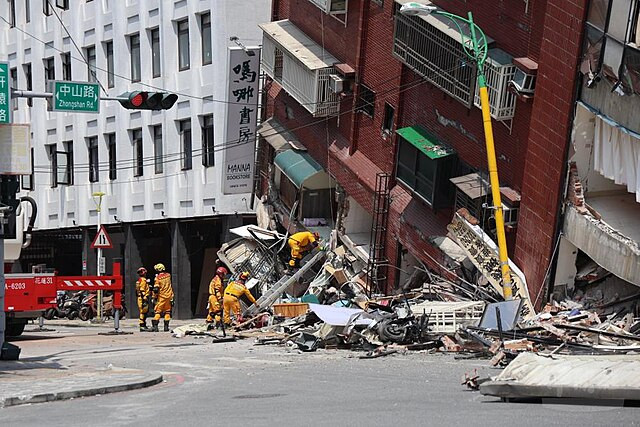A powerful 7.4-magnitude earthquake struck off the coast of Taiwan on Wednesday, killing at least nine people, injuring hundreds, and causing widespread damage across the island. The tremor, which hit at around 8 a.m. local time (8 p.m. Tuesday ET), was the strongest to hit Taiwan in at least 25 years, according to seismology officials.
The epicenter of the quake was located about 11 miles south-southwest of Hualien City on Taiwan's east coast, at a depth of approximately 21 miles, as reported by the U.S. Geological Survey (USGS). The Taiwan's earthquake monitoring agency measured the quake at a magnitude of 7.2, while the USGS recorded it as a 7.4.
As of Wednesday evening, Taiwan's fire department confirmed that at least nine people had died and 882 were injured due to the earthquake. Officials warned that the number of casualties could rise in the coming days as rescue efforts continue.
The earthquake triggered tsunami warnings in Taiwan, Japan, and the Philippines, which were later lifted. In Japan, officials initially warned of waves up to 3 meters (about 10 feet) high in some areas of Okinawa prefecture, but the forecasts were later downgraded. The biggest reported wave was 30 centimeters (about 12 inches) on the Japanese island of Yonaguni, which is close to Taiwan.
Annie Lima, an American who has lived in Taiwan for almost 17 years, described the quake as "pretty scary" and "by far the strongest and the most frightening" she had experienced. "Even there in a doorway on the second floor, we could barely keep our balance, you know, holding both sides of the doorway," she told NBC News. "And all around us things were falling off the walls and off shelves, smashing and crashing everywhere."
The damage was concentrated in the eastern Taiwan county of Hualien, near the quake's epicenter, where officials said they were working to free 131 people who were trapped. Videos on social media showed collapsed buildings, with one appearing to be nine stories tall and partially collapsed, standing at an angle.
Jason Delickta, an American living in nearby Meilun, said his restaurant in Hualien, the Salt Lick Smokehouse & Grill, suffered significant damage. "We lost most of our plates, because they're all on top of the line, and so they all were shaking and fell off," he said. "We lost a lot of liquor bottles, beer bottles, glasses, things like that."
The earthquake disrupted rail services and damaged the main road into Hualien, which Delickta said would likely have a significant economic impact on the town, as it relies heavily on tourism during the upcoming four-day holiday for the traditional Chinese festival known as Tomb-Sweeping Day.
The earthquake knocked out power for more than 87,000 households and was followed by a series of aftershocks, the biggest of which measured 6.5, according to Taiwan's Central Weather Administration. Taiwan President Tsai Ing-wen said a disaster response center had been set up and that the National Army would provide support to local governments. She also urged people to avoid using elevators and to pay more attention to safety due to the ongoing aftershocks.
TSMC, one of the biggest companies in Taiwan's crucial semiconductor manufacturing industry, reported that its safety systems were operating normally and that some fabrication plants had been evacuated as a preventive measure. "All personnel are safe, and those evacuated are beginning to return to their workplaces," the company said in a statement.
The earthquake was felt across the region, with social media users in China's Fujian province and cities like Shanghai and Hangzhou reporting tremors. In the Chinese territory of Hong Kong, the Hong Kong Observatory received more than 100 reports of tremors, describing the vibration as akin to the "passing of light trucks."






